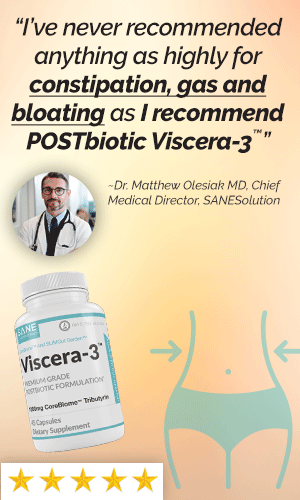Postbiotic Supplements Guide
Postbiotic supplements overview
A growing body of scientific evidence suggests that postbiotic supplements can replace probiotics.
What are postbiotics? The term “postbiotics” refers to bioactive compounds produced when friendly (probiotic) bacteria consume fiber (prebiotics) in the lower colon. Postbiotics with the proper organic acids and bioactive compounds, such as butyrate or butyric acid, allow for a myriad of health benefits that replace probiotics AND prebiotics.
Indeed, experts believe that postbiotics are responsible for many of the health benefits often associated with probiotics.
Postbiotic supplements: a guide to gut health benefits
On this page, you will learn what Postbiotics are and why they are critically important for your health and weight management.
Postbiotic supplementation with pills (like Viscera-3) promotes a good gut environment that leads to less bloating, a stronger immune system, and a plethora of health benefits similar to dietary fiber without the gastrointestinal distress that usually accompanies its digestion. For certain individuals seeking additional support in weight management, weight loss drugs may also be considered alongside postbiotics. These medications, under medical guidance, can complement a gut health regimen by addressing metabolic concerns and supporting a balanced microbiome.
When beneficial bacteria consume (ferment) fiber, they excrete a postbiotics supplement product that can unleash health benefits such as:
- Improved gut physiology
- Leaky gut repair
- Reduced inflammation (Certain postbiotic metabolites are known to exert an anti-inflammatory response)
- Health effects that include boosting or supporting immune response, which includes an anti-inflammatory response
Value of a Balanced Microbiome
Imagine your gut as a bustling city, where trillions of inhabitants, known as the microbiome, work around the clock to ensure everything runs smoothly. These tiny yet mighty organisms play a pivotal role in our health, from digesting food to bolstering the immune system. A balanced microbiome is akin to a well-orchestrated symphony, where each microbe performs its part in harmony, leading to a state of well-being that resonates through every aspect of health.
The microbiome’s influence extends far beyond the gut. It’s intricately linked to our mental health, weight management, and even the prevention of chronic diseases. Weight loss drugs, when used responsibly, may work synergistically with a healthy microbiome to improve metabolic health and facilitate weight loss for compatible individuals. Maintaining a diverse and balanced microbiome is essential to maximize the effectiveness of such interventions.
Like any bustling city, the key to the microbiome’s success lies in its diversity and balance. A varied diet rich in fibers, vegetables, and probiotics is the foundation for a thriving microbial community. These nutritional choices are the building blocks that support a diverse microbiome, much like parks, schools, and hospitals support a thriving city.
However, just as a city can face challenges, so too can our microbiome. Processed foods, excessive sugar intake, and antibiotics can disrupt this delicate balance, leading to a condition known as dysbiosis. This imbalance is like a city in disarray, where essential services are disrupted, leading to health issues such as digestive discomfort, weakened immunity, and even mood swings.
What are Postbiotics and What Do They Do?
Postbiotics might not be as commonly discussed as their relatives, probiotics, and prebiotics, but they play a crucial role in maintaining health. Think of them as the beneficial byproducts produced when probiotics, the good bacteria in our gut, digest prebiotics, the fiber that feeds them. These byproducts include vitamins, short-chain fatty acids, peptides, and other metabolites that directly impact health.
The role of postbiotics is multifaceted: they help to regulate the immune system, protect the gut lining from harmful bacteria, and reduce inflammation. Essentially, postbiotics can be seen as the health-enhancing gifts left behind by probiotics as they consume prebiotics. These gifts profoundly impact our well-being, supporting not just gut health but influencing overall health conditions, from mood regulation to weight management and even the prevention of chronic diseases.
What’s the Difference Between Probiotics, Prebiotics, and Postbiotics?
Navigating the world of gut health can sometimes feel like learning a new language, especially with terms like probiotics, prebiotics, and postbiotics frequently mentioned. Each uniquely supports our well-being, yet they work together in a synergistic dance that promotes a harmonious gut microbiome. Here’s how they differ:
Probiotics
These are the live, healthy bacteria that reside in our gut. Like friendly city dwellers, they help digest food, produce vitamins, and protect against harmful bacteria.
Probiotic foods are fermented. So, incorporating fermented foods like yogurt, kefir, and kimchi into our diet boosts our probiotic population, akin to welcoming more helpful neighbors into our community.
Prebiotics
Prebiotics are the dietary fibers that feed the probiotics. They’re found in foods like bananas, onions, garlic, and whole grains. Think of prebiotics as the nourishing food that keeps our probiotic friends happy and thriving.
By eating a diet rich in these fibers, we’re essentially throwing a feast that encourages the growth of beneficial bacteria.
Postbiotics
When probiotics feast on prebiotics, they produce postbiotics. These are the health-promoting byproducts of the fermentation process that occurs in the gut, including substances like short-chain fatty acids.
Postbiotics help strengthen the gut barrier, support the immune system, and reduce inflammation. They’re the beneficial gifts left behind, contributing to our health long after the probiotics have digested their prebiotic meal.
Postbiotic metabolites include:
- B-vitamins synthesis: (biotin, cobalamin, folate, nicotinic acid, pantothenic acid, pyridoxine, riboflavin, and thiamine)
- Vitamin K: Essential for proper blood clotting and bone metabolism. It also regulates blood calcium levels.
- Short-chain fatty acids (SCFAs): acetate, propionate, and butyrate.9: They are essential to gut integrity and provide numerous health benefits.
- Glutathione: Postbiotics may reduce the risk of several diseases – including diabetes, cancer, and rheumatoid arthritis – by reducing oxidative stress. (Oxidative stress in the cells occurs when the body cannot fight off free radicals sufficiently.)
- Antimicrobial peptides (AMPs): Postbiotics may protect the body against dangerous pathogens. And unlike traditional antibiotics, antimicrobial peptides appear to slow pathogenic resistance to them.
- Phenyllactic acid: Postbiotics may and have shown antibacterial properties against various bacteria.
- D-amino acids: Appear to have bacterial regulatory properties.
- Hydrogen peroxide: Has been shown to have antibacterial properties that may help you fight off infection.
- Volatile organic compounds (VOCs): Postbiotics may serve as a marker for the presence or absence of certain harmful microbes.
- Urolithin A and Urolithin B: Like phytoestrogens, they may display behavior that mimics estrogen in the body.
Prebiotic and probiotic foods are necessary for the production of probiotic metabolites. Understanding the distinct roles of probiotics, prebiotics, and postbiotics illuminates the importance of a diet that supports all facets of gut health. By nourishing our body with a variety of these vital dietary components, we lay the foundation for a robust and balanced microbiome, setting the stage for optimal health and well-being.
5 Ways Postbiotics Benefit the Gut
In pursuing optimal health, understanding the various components contributing to gut health is paramount. Among these, postbiotics emerge as key players in maintaining and enhancing gut health. These beneficial byproducts of probiotic activity offer a host of advantages for our digestive system and overall well-being. Here’s an exploration of five pivotal ways postbiotics benefit the gut:
1. Supporting a Strong Gut Barrier
A robust gut barrier is essential to protecting our body from harmful substances and pathogens. Postbiotics, such as short-chain fatty acids, are critical in reinforcing this barrier. They nourish the cells lining the gut, promoting the integrity and function of this protective layer.
This is akin to fortifying the walls of a city, ensuring that only the right substances pass through while keeping potential threats at bay.
2. Regulating the Immune System
The gut is a major immunological battleground where much of our body’s defense mechanisms are coordinated. Postbiotics have been shown to modulate the immune response, helping to prevent excessive inflammation, which is often a precursor to many chronic diseases. By fine-tuning the immune system’s activity, postbiotics ensure that it’s vigilant against infections without overreacting and causing inflammatory diseases.
3. Enhancing Nutrient Absorption
The digestive process is all about breaking down food into nutrients that our body can absorb and utilize. Postbiotics facilitate this process by influencing the gut environment in a way that optimizes nutrient absorption. This means that the body can more efficiently glean the vitamins, minerals, and energy from the food consumed, much like a well-oiled machine operates at peak performance.
For certain individuals on weight loss drugs, postbiotics can further enhance their effectiveness by promoting better nutrient absorption and supporting overall gut health. A healthy gut environment ensures that weight loss efforts are optimized and sustainable.
4. Detoxification and Protection Against Pathogens
Postbiotics contribute to the detoxification processes in the gut, helping neutralize toxins and preventing their absorption into the bloodstream. Moreover, some postbiotics have antimicrobial properties, protecting against harmful bacteria and other pathogens. This dual action is akin to having a sophisticated waste management and security system in a city, keeping the environment clean and safe for its inhabitants.
5. Promoting a Balanced Microbiome
The diversity and balance of the gut microbiota are crucial for health. Postbiotics play a role in promoting the growth of beneficial bacteria while inhibiting harmful ones, contributing to a balanced and healthy microbiome. This balance is essential for digestive health and the body as a whole, influencing everything from metabolism to mood.
Lifestyle Changes to Enhance Postbiotic Production
Embracing lifestyle changes that enhance the production of postbiotics is a proactive step towards better health.
This includes consuming a diet rich in fibers that feed probiotics, incorporating fermented foods to increase probiotic populations, and engaging in regular physical activity. You can also regularly take high-quality postbiotic supplements like SANE Vitaae.
Individuals can naturally boost their postbiotic levels by making these adjustments, paving the way for improved gut health and overall well-being.
Why the Postbiotic Supplement TRIbutyrin is the Best
After years of research, scientists have combined 3 Butyrate molecules with a glycerol molecule to create a radically more effective version of this “optimal” short-chain fatty acid.50 And that’s how TRIbutyrin was created.
There are several supplements for gut health on the market today. Research clearly shows that Viscera-3 is superior to any other post-biotic brand.
With Viscera-3, this superior form of TRIbutyrate is time-released directly into your lower colon (the only place it can provide all the above life-changing gut benefits). It is three times more potent than the weak short-chain fatty acids created by fiber alone.
This patented nutrient is the fastest, easiest, and most effective way to poop a more normal, healthier stool and enjoy a slimmer, less bloated waist in just 48 hours!
Give this postbiotic a try and see for yourself today!
Gut Health FAQ
Navigating through the wealth of information on gut health can sometimes feel overwhelming. Here are five frequently asked questions that shed light on this crucial aspect of well-being, offering insights into nurturing and maintaining a healthy gut.
1. What role does diet play in maintaining gut health?
Diet is fundamental to gut health. Consuming a variety of fiber-rich foods, such as vegetables, fruits, and legumes, supports a diverse microbiome, which is essential for digestion, nutrient absorption, and immune function. Including fermented foods like yogurt and kefir introduces beneficial probiotics, while prebiotic foods provide the necessary fuel for these good bacteria to thrive. A balanced diet, rich in whole foods, creates an environment conducive to gut health, directly influencing overall well-being.
2. How can stress affect the gut?
Stress can profoundly impact the gut, often referred to as the “second brain” due to its sensitivity to emotion. Stress can alter gut bacteria composition and function, leading to issues like increased inflammation, a weakened immune response, and changes in gut permeability. This can manifest as digestive discomfort, changes in appetite, or food sensitivities. Managing stress through mindfulness, exercise, and sufficient rest is key to maintaining gut health.
3. Are all bacteria in the gut harmful?
Not at all. The gut hosts a complex community of bacteria, most of which are beneficial and essential for health. These beneficial bacteria help with digestion, produce vitamins, protect against pathogens, and support the immune system. Only a small fraction of bacteria in the gut can be harmful if they multiply beyond normal levels. Maintaining a balanced microbiome through a healthy diet and lifestyle is crucial for keeping harmful bacteria in check.
4. What are the signs of an unhealthy gut?
An unhealthy gut can manifest in various ways, including persistent digestive issues (like bloating, gas, diarrhea, or constipation), unexpected weight changes, constant fatigue, skin irritation, and food intolerances. These symptoms can indicate an imbalance in the gut microbiota or other underlying gut health issues. If experiencing any of these symptoms regularly, it’s advisable to consult a healthcare professional.
5. Can gut health influence mood and mental health?
Yes, the gut and brain are closely connected through the gut-brain axis, and the health of one can significantly impact the other. An imbalance in gut bacteria has been linked to mood disorders, including depression and anxiety. Beneficial gut bacteria produce neurotransmitters like serotonin, which is crucial in regulating mood. Ensuring a healthy gut through diet, probiotics, and lifestyle choices can positively affect mental and emotional well-being.
Embracing Gut Health: A Path to Well-being
Exploring the intricate world of gut health reveals a profound truth: the path to overall well-being begins in the gut. From the protective benefits of a balanced microbiome to the nurturing power of postbiotics, each step toward gut health is a step toward a fuller, more vibrant life.
Understanding the symbiotic relationship between probiotics, prebiotics, and postbiotics illuminates the way forward, offering a blueprint for not just surviving but thriving.
Share this journey with friends and family across all social media platforms and via email, inviting them to join in this transformative journey toward health, happiness, and harmony. Let’s cultivate a community where gut health is a shared treasure, unlocking the door to comprehensive well-being.










Trackbacks & Pingbacks
… [Trackback]
[…] Read More here: sanesolution.com/digestive-care/postbiotic-supplements/ […]
[…] it does it quickly, efficiently, and effectively. This wildly popular gut-health postbiotic formulation is available […]
[…] postbiotic supplements, and routine health checks are a great way to maintain a healthy gut […]
Comments are closed.